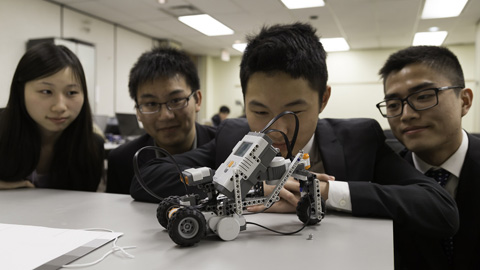
Imagine nearly 300 rival engineering students, seven competitions, 18 planet-seeking robots and a disco ball. That was the scene at the 12th annual University of Toronto Engineering Kompetition (UTEK).
On January 25, U of T undergraduates gathered to compete in engineering design, consulting, programming and parliamentary debate. Winners qualified to represent U of T at the Ontario Engineering Competition (OEC) and potentially the Canadian Engineering Competition (CEC).
 “This year’s participation was a record high,” said Kenny Wong (ChemE 1T5), Co-Director of the 2014 UTEK Event. “Each year we see more and more students from across the Faculty wanting to compete.”
“This year’s participation was a record high,” said Kenny Wong (ChemE 1T5), Co-Director of the 2014 UTEK Event. “Each year we see more and more students from across the Faculty wanting to compete.”
Knowing this, Wong and fellow Co-Director Suhaib Ahmed (ECE 1T5) opened up more student spots for 2014. Their team also invited over 50 professors, staff and alumni to judge the competitions, along with representatives from event sponsors like Altera, AMEC and Rocscience.
With tight deadlines and a lot of pressure, UTEK gave students the opportunity to develop and practice critical teamwork, design and communication skills that are essential for professional engineers.
“We worked with industry leaders to come up with real-world problems,” said Ahmed. “This gave participants an organic taste of engineering and a chance to network with professionals. We owe a special thanks to the Engineering Alumni Association for their invaluable support and our judges for their time and effort.”
In the Altera Senior Design Competition, students had to use Lego Mindstorms to build autonomous robots that simulated a space ship leaving the International Space Station. The robot had to navigate through an asteroid belt to one of three planets (made of disco balls and pomelos) after reading an encoded binary message.
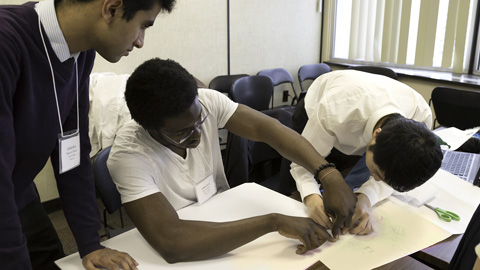
UTEK also included a new Mobile Applications Design competition this year, where students had to create smartphone apps in less than seven hours. Competitors raced against the clock to design apps that connected to a car’s on-board computer and got real-time data like mileage and fuel in the tank.
“I gained a valuable experience participating at UTEK. Not only was it fun, but I learned new skills that I couldn’t have learned in the classroom,” said Nicholas Valenton (CivE 1T5). “This is definitely something I want to do next year.”
If you are interested in volunteering as a judge at similar events in the future, please contact Sonia De Buglio, Director of Alumni Relations and Giving.

Through a global recession, the dot-com crash and a chaotic mail strike, entrepreneur and U of T alumnus Adam Froman (MIE 8T8) has seen adversity, and lots of it.
His advice? Follow your passion and just keep going.
Froman, CEO of digital strategy firm Delvinia, was on campus this week to encourage Engineering undergraduates to be pragmatic and prepared entrepreneurs. Hosted by U of T’s Entrepreneurship Hatchery, he spoke to over 85 students about how to overcome the constant challenges that come with owning a business.
“Don’t be afraid of failure. If you fear failure, it’s going to stop you from finding a solution,” said Froman. “Failure is only really when you give up. If something doesn’t work, stay calm and be patient.”
With over 20 years as an entrepreneur, Froman also advised students to learn about the practical side of starting a company. He repeatedly spoke about the importance of learning and understanding the discipline of cash flow through high times and low.
Delvinia, which Froman started over 15 years ago, now has over 50 employees, and has serviced over 266 clients on 2,327 projects. Froman pulls from this knowledge to mentor university students.
“His talk was very inspirational,” said Ivan Zdravkovic (MIN 1T5 + PEY). “It was nice to have the mix of learning what he’s done and how he thinks we can succeed.”
Froman attributed his technical acumen and success in part to his U of T education: “For engineering, U of T is one of the preeminent programs in the country. People understood what having the University of Toronto on my resume meant, and to this day, they still do. The innovation happening at U of T is second to none.”
Froman is a Professional Engineer and also has an MBA specializing in Strategy and Finance from the Schulich School of Business. He recently released a new e-book that chronicles his experience, Delve In, Dig Deep: An Entrepreneurial Journey.
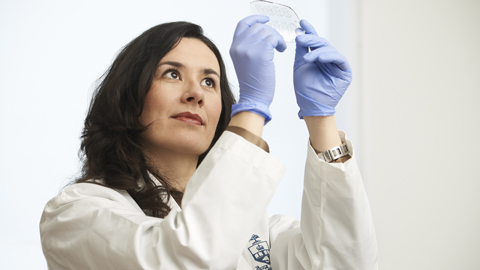
U of T engineer Milica Radisic (IBBME/ChemE) has won one of six E.W.R. Steacie Memorial Fellowships.
The competitive and prestigious fellowship is given by the Natural Sciences and Engineering Council of Canada (NSERC) to enhance the career development of outstanding and highly promising university faculty who are earning a strong international reputation for original research.
Radisic will hold the fellowship, which comes with a $250,000 research grant, for two years.
Appointed in the Department of Chemical Engineering and Applied Chemistry (ChemE) and the Institute for Biomaterials and Biomedical Engineering (IBBME), Radisic is a tissue engineer working on using stem cells to grow new organs. Her work focuses on creating samples of both healthy and diseased human heart tissue to use as models for drug discovery and testing, though she ultimately hopes to see stem cells used to replace heart tissue. Her team recently discovered a way to create beating heart cells from stem cells using electrical pulses to mimic the heart rate of fetal humans (the study was published in Nature Methods).
Radisic, who accepted the Steacie on behalf of all the recipients at a ceremony in Ottawa, thanked NSERC for investing in projects that require long-term vision and commitment.
“Let me draw on my own research as an example,” she said. “Every year, nearly one million people in North America suffer from myocardial infarction, known as heart attacks. It is thanks to NSERC’s support that my laboratory is able to pioneer new types of bio-engineering approaches for creating heart tissue and vasculature in the lab, that could one day be used to mend your heart, mend the hearts of your loved ones, and those of many generations to come.”
“Professor Radisic is pushing the boundaries of science with her ambitious and creative work,” said Professor Paul Young (CivE), U of T’s vice-president (research and innovation). “I’m delighted to see her accomplishments recognized with such a prestigious award.”
Radisic, who also holds the Canada Research Chair in Functional Cardiovascular Tissue Engineering, was recently named a scientist to watch by Scientist Magazine, and holds a Connaught Innovation Award, one of U of T’s leading internal research awards.
“Milica Radisic’s groundbreaking work on cardiovascular tissue engineering has the potential to revolutionize treatment for the millions of people worldwide affected by cardiovascular disease,” said Cristina Amon, Dean of the Faculty of Applied Science & Engineering. “I offer my heartfelt congratulations to Milica for this remarkable recognition and thank the selection committee of the Steacie Prize for providing her with this fellowship to advance her research program.“
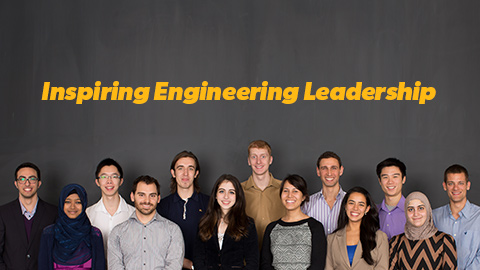
It was a unique collaboration between prominent business leaders and U of T Engineering students, who gathered to discuss a burning question: What do engineering students think about leadership in their field?
This month, U of T’s Institute for Leadership Education in Engineering (ILead) brought together 20 senior leaders from engineering-focused companies to engage for the first time with 18 graduate and undergraduate students on their future as engineers.
The conversation between industry leaders like Colin Anderson, CEO of Ontario Power Authority, and Elaine Campbell, President of AstraZeneca Canada, and students focused on mentorship and the demand for engineers to lead multidisciplinary teams.
The message from all involved was loud and clear: leadership development cultivates better students today and better engineers in the workforce tomorrow.
“The CEOs were totally engaged and nodding their heads when students spoke; it was clear that our experiences as students mattered to them,” said Lobna El Gammal (ChemE 1T4), whose fourth-year thesis focuses on leadership and the PEY experience. “I was given a platform to say how important leadership education is to me and to learn from these accomplished business people.”
ILead Director, Professor Doug Reeve (ChemE), who hosted the event, believes that U of T Engineering’s leadership programs help to distinguish it as a centre of excellence.
“We have a bold vision for the 21st century engineer,” said Professor Reeve. “By giving students opportunities to grow in areas critical to their success, such as authentic self-leadership, team skills and organizational savvy, U of T Engineering is preparing a generation of engineers to tackle the world’s greatest challenges.”
ILead is a unique hub for leadership learning that offers academic courses, certificates and department-based programs to all U of T Engineering students.
The Institute will find its new home in the Centre for Engineering Innovation & Entrepreneurship (CEIE), a dynamic new environment that will foster creativity and inspire 21st-century learning and innovation. The CEIE is set to break ground later this year.
To view student reactions to the event, please visit the ILead YouTube channel.
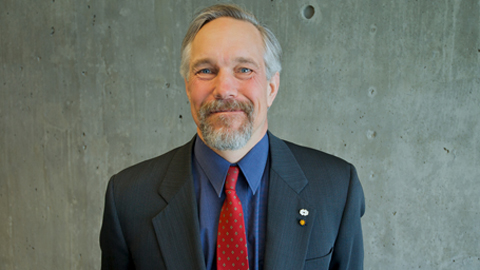
Professor Grant Allen, Chair of the Department of Chemical Engineering & Applied Chemistry, is this year’s recipient of the LeSueur Memorial Award, an honour presented by The Chemical Institute of Canada that recognizes the technical excellence in either a university/research institute or industrial setting in Canada.
Professor Allen’s area of research is environmental bioprocess engineering, with particular application to the treatment of aqueous and gaseous emissions and in adding value to wastes by utilizing them for the production of energy, materials and chemicals. He received considerable support and collaborated with the Pulp and Paper industry and led several environmental research consortia involving both faculty and students from a range of disciplines and industrial partners from Canada and abroad (e.g. USA, Brazil, Japan, Sweden, Finland and New Zealand).
Professor Allen’s applied research in the areas of waste treatment technologies has seen significant shifts in sector process approaches, such as minimization of organochlorine contaminants, use of biofiltration for air emissions, and the emergence of anaerobic digestion as a viable, large-scale solution to pulp and paper effluent treatment. Most recently, he has focused on using bioprocessing to produce value-added materials and energy from waste, including the development of algae biofilm bioreactors to generate biofuel from carbon dioxide and wastewater, and extracting adhesives and surfactants from waste biosludge.
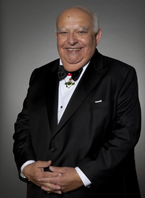 Adel S. Sedra, professor and former chair of The Edward S. Rogers Sr. Department of Electrical & Computer Engineering, has been appointed to the Order of Ontario for 2013. The appointees were announced January 23 and invested by the Honourable David C. Onley, Lieutenant Governor of Ontario, at a ceremony at Queen’s Park.
Adel S. Sedra, professor and former chair of The Edward S. Rogers Sr. Department of Electrical & Computer Engineering, has been appointed to the Order of Ontario for 2013. The appointees were announced January 23 and invested by the Honourable David C. Onley, Lieutenant Governor of Ontario, at a ceremony at Queen’s Park.
Professor Sedra was selected for his distinguished engineering career as scholar and professor, as well as a leader in university administration. His seminal work has resulted in major developments in fields ranging from medical technology to wireless communications. With Professor K.C. Smith, Professor Sedra co-authored Microelectronic Circuits, the best-selling engineering textbook in history.
Created in 1986, the Order of Ontario, the province’s highest official honour, recognizes the highest level of individual excellence and achievement in any field. Professor Sedra is one of eight members of the University of Toronto community to be appointed in 2013. Also appointed were journalist Steve Paikin, film director David Cronenberg, lawyer and rights activist Avvy Yao Yao Go and pediatric neurosurgeon James Rutka, among other luminaries.
“Our province is richer for the contributions of these distinguished individuals,” said the Honourable David C. Onley, Lieutenant Governor of Ontario. “Through drive and determination they have pushed boundaries and serve as truly outstanding examples for all Ontarians.”
Professor Sedra received a B.Sc. degree from Cairo University, Egypt, in 1964, and his M.A.Sc. and Ph.D. degrees from the University of Toronto in 1968 and 1969 respectively; all in electrical engineering. He joined the faculty of the University of Toronto in 1969, rising to the rank of Professor in 1978. He served as chair of ECE from 1986-1993, and assumed the position of Vice-President, Provost, and Chief Academic Officer of the University of Toronto in 1993, a position he held until 2002. He joined University of Waterloo in 2003 as Dean of the Faculty of Engineering and a professor of Electrical and Computer Engineering.
Professor Sedra returned to University of Toronto earlier this month to deliver a Distinguished Lecture on his vision for the future of universities.
